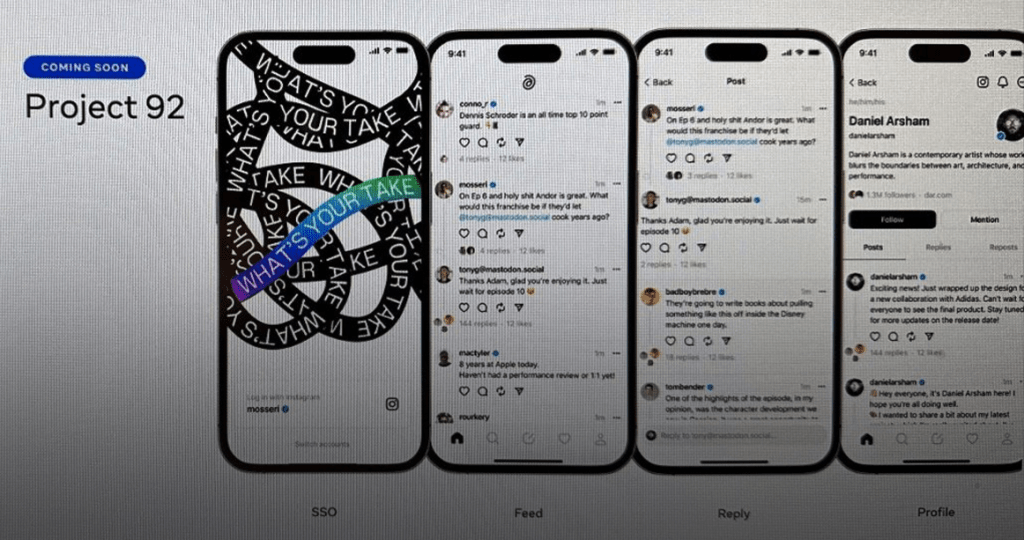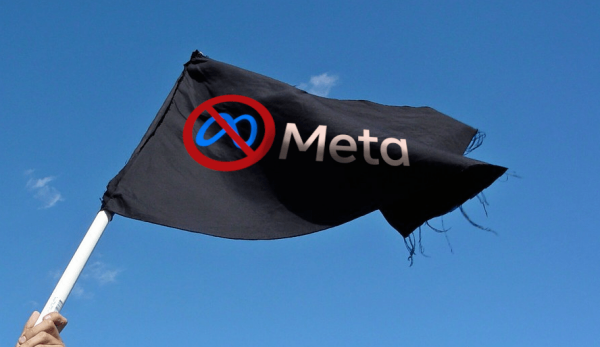Note: This entry is part of our new Opinion section, which exists to offer different perspectives from various voices on the network. Members of the community are absolutely encouraged to submit their own pieces for publication.
John Gruber, legendary Mac enthusiast and operator of the blog Daring Fireball, has some strong opinions about the Fediverse’s negative reaction to Meta. Recently, this came to a head with FediPact, an admin petition to defederate from Meta. He’s so passionate about the subject that he’s already written a second piece.
I’d like to try to address some of his points, because I believe he’s gotten a lot of things wrong. John Gruber, I don’t think you’re a bad guy, and I don’t hate you. I just think you haven’t been in the space long enough to really know much about it.
Let’s Dive In
From his first entry:
…the idea that administrators of Mastodon/Fediverse instances should pledge to preemptively block Facebook’s imminent Twitter-like ActivityPub service (purportedly named Threads) strikes me as petty and deliberately insular…John Gruber
This is something of a false dilemma. If some random developer with no track record tried to build an app, and was viciously shunned because he wasn’t a part of the in-group, that would absolutely qualify as petty and deliberately insular.
Meta is not a person, it’s a corporation. No amount of chanting “corporations are people, my friend” is going to change that. Facebook alone has a noxious track record a mile long, has repeatedly abused open standards for its own benefit, and their negligence and poor decisions have spread misinformation, genocide, and hatred over and over again.
They can’t even moderate their own platforms properly, let alone treat their contracted moderators well.
The Fediverse and Growth
The Fediverse was started, aided, and cultivated by many different people over a considerable amount of time. Many of those who are here did so to be free of the kind of things that Facebook/Twitter/Reddit were doing to their respective communities. For-profit corporate walled gardens are already problematic enough.
But there are literally billions of good people who use their services. Why cut them off from the open ActivityPub social world?
Confusing users with a service is disingenuous, at best. No one is stopping anyone that uses Facebook from joining the Fediverse. We just want to stop the company itself from bending the network to its own ends.
What’s actually kind of crazy is that people have created a number of services to assist with user migration from Twitter, like FediFinder. But, wouldn’t you know it, those platforms tend to shoot down the lifeboats when that affects their bottom line.
We’re fine with building new user communities and growing the network. It’s the corporate end that we have a problem with. This is part of why FediPact exists.
Onboarding is Our Achilles’ Heel
Large swaths of Mastodon seem to relish the fact that it’s confusing how to get started, and that this confusion is keeping Mastodon small.
First of all: the notion of relishing keeping the network small isn’t a thing. Most people on the network are thrilled to see it grow and evolve – which it has been doing organically, without any kind of commercial advertising, for over 15 years.
The pushback that people have is towards growth for its own sake, a numbers-chasing game where over-simplified sign-up tools trend towards centralization. Some Mastodon instances, for example, are possibly massive, with hundreds of thousands of users, and like a team of six moderators. It’s not a sustainable situation, and it creates a lot of social problems on the network.
The Purpose of Federation
The whole point of ActivityPub as an open protocol is to turn Twitter/Instagram-like social networking into something more akin to email: truly open.
This might blow your mind, but the scope is way more ambitious than just making federated clones of popular services: it’s a framework to connect separate spaces of the Internet together.
Federation might work in a manner similar to email, but the goal was always to bring social capabilities to the rest of the web, and providing interoperability. From my Mastodon, I can follow a band on Funkwhale, comment on a video from PeerTube, send a link with a paragraph of text to a group on Lemmy, and then comment on a WordPress blog. And that’s only the beginning.
The true power of ActivityPub has yet to be fully realized, but it brings an opportunity to do some things with servers and clients that have never been seen before. We can break out of walled gardens and use the interoperability across the web as platforms for all of our apps.
Facebook Didn’t Do Anything Yet
Maybe I’m wrong! I certainly don’t think the “let’s pledge to block Facebook before their Fediverse thing even starts” people are nuts. But to me this feels like convicting Facebook of a pre-crime.
This isn’t Minority Report. While people are judging what Meta might do in the future, those notions are informed on how Facebook has acted globally in the past. Giving them a chance in the first place here could actually be considered giving them a second chance for the long list of crap they’ve already done.
From his second article:
I don’t think most Instagram users will even try Threads…“just sign in using your existing Instagram identity” is a powerful enticement. If you already have an Instagram account, you’ll be able to jump right in.
The thing with Threads is that it’s likely not going to be open source, and people won’t be able to self-host it. It will be a singular node on the network, tied into infrastructure that Meta explicitly controls. So yeah, of course they have easy integration and a way for people to try it out in Meta’s sandbox.
Getting Started in the Fediverse is Hard
How to get started with Mastodon (or any of the other ActivityPub “Fediverse” platforms) has been an enormous obstacle to adoption
I’d be lying if I said that we’ve managed to crack this nut. Discovery in peer-networked systems is notoriously hard. There are a lot of nuances to how different servers interact, and the complex politics behind who will talk to who can be absolutely irksome. But I don’t think users are stricken with absolute analysis paralysis like some suggest.
How do I join in fun discussions? Who is worth following? Where is all the good stuff at? These kind of questions take a lot ingenuity in design, in a system where you can’t just throw a few billion people’s data at it.
The thing is, at the end of the day, you just have to pick a place and see if you like it. You can always try a different space, or be part of multiple spaces, until you’ve really found a place you’re comfortable in. Most of my friends on the network aren’t even on my server, and we manage to communicate anyway. The process is just organic for now, rather than automatic.
Comparison to Email
I cited email as an example yesterday of big companies running big instances and not extinguishing the openness that made the platform great.
Actually, email is probably not a great example to use. 30 years ago, your analogy might be apt, but the ecosystem of email has largely been dominated by a few major players that successfully gatekeep it these days.
I recommend trying to run your own email server in 2023, and see how many of your emails ultimately go through to your peers, to people operating services, or to support desks. Better yet, try running an independent newsletter with it. You’ll likely end up in people’s Spam folders, if your message gets delivered at all.
Comparison to Podcasting
I don’t take podcasting’s future for granted, but 20 years in, it’s still thriving as an open medium, despite the presence of titanic players like Apple, Amazon, YouTube, and Spotify.
If podcasts have continued to thrive, it is only in spite of those companies efforts to build walled gardens around it. Despite companies like Spotify trying to make certain podcasts exclusive to their platforms, or Google killing off feed readers, no one has actually succeeded at killing off a simple feed anybody can subscribe to.
And there are some roles that we need big centralized players to play even on an open platform. Apple’s iTunes podcast directory, for example. Facebook’s Threads app could be something akin to Apple Podcasts for Mastodon.
I dunno, John, this is a weird metaphor. I get that you’re trying to say “a simplified, popular thing that everyone knows could be a powerful way for everyone to interface with the network”, but this is also kind of a maximalist stance towards everyone federating with one very big corporate node.
Does the network really need this? Is crawling our entire network for the purposes of discovery and entertainment on Meta’s corporate node, and maybe even monetizing our public data along the way, a price worth paying for their presence here?
The Reddit Migration
Kbin and Lemmy are to Reddit what Mastodon is to Twitter. Unsurprisingly, they’ve both seeing an infusion of new users this month, but are both still tiny compared to Reddit.
And many of those people might go back, or they might stick around. Still, the network will grow. This doesn’t have to be a “line go up” dick measuring contest, where the network with the biggest number is the winner. We just have to be around longer than they are.
Are NDA’s Evil?
The idea that NDAs are inherently nefarious is just conspirational tinfoil-hat nonsense.
I think this is an oversimplification. NDAs can be incredibly binding – let’s say that Meta did this with a fediverse developer, and then showed that developer several features they plan to implement. The developer working on their own version for compatability may well be in violation of the NDA, and can cause some real legal headaches for some guy that’s just building his own thing.
The Goal of the Fediverse?
I’ll close this post with the same question I did yesterday: Is the goal of the Fediverse to be anti-corporate/anti-commercial, or to be pro-openness? I think openness is the answer.
The idea of forming this question as a binary “this or that” is ridiculous, and predicated on a nebulous idea that open source communities should just roll over and be grateful that some insanely profitable entity wants to do real estate development right outside of our digital homes.
The Fediverse is developed by many people, building many different projects, over the course of many years. It has a long history of being cultivated by geeks and queers and marginalized folks who had no other space to go to. It is open to those who are willing to follow a social contract, to not tear down a beautiful forest to replace it with a shopping mall, dump toxic waste in our streams, or exert influence over the ecosystem we have been building.
If I had to ascribe a goal to the Fediverse, it’s to transform the Open Web into something so powerful, that it renders all of the corporate social silos of the world redundant and unnecessary.
https://wedistribute.org/2023/06/john-gruber-no-understand/
#FediPact #fediverse #Meta
The whole point of an open protocol like ActivityPub is that no one can own it.
Daring Fireball



